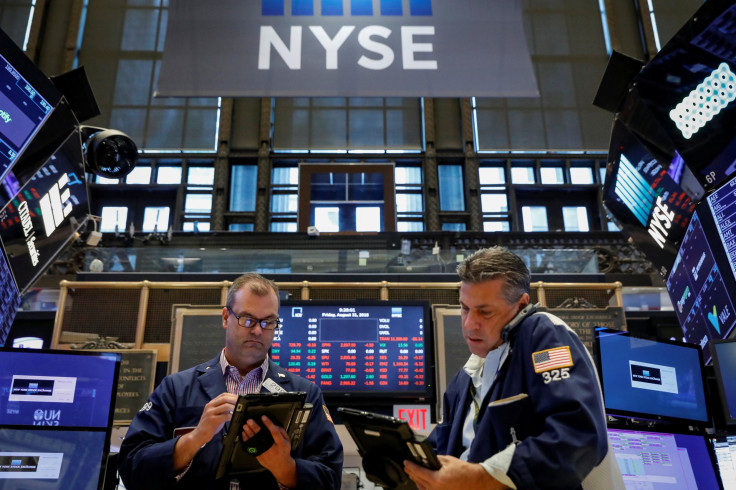Monday's Stock Market Close: US Equities Rise As US Removes China’s Currency Manipulator Tag

KEY POINTS
- U.S. removes China from list of nations deemed to be currency manipulators
- U.S. and Chinese officials are expected to sign trade deal on Wednesday.
- US stock indexes are at or near all-time highs
U.S. stocks closed higher on Monday as the U.S. said it will remove China’s name from a list of currency manipulating countries, ahead of the signing of the phase one trade agreement between the giant economic rivals.
The Dow Jones Industrial Average gained 81.72 points to 28,905.49 while the S&P 500 rose 22.71 points to 3,288.06 and the Nasdaq Composite Index advanced 95.07 points to 9,273.93. The S&P and Nasdaq closed at record highs.
Volume on the New York Stock Exchange totaled 2.74 billion shares with 2,016 issues advancing, 237 setting new highs, and 917 declining, with 23 setting new lows.
Active movers were led by General Electric (GE), NIO Inc. (NIO) and Acasti Pharma (ACST).
China’s senior trade official Liu He and his team are expected to sign a phase one trade deal with the U.S. on a visit to Washington on Wednesday. The deal is expected to reduce tariffs on some Chinese goods, and provides for an increase in Chinese purchases of U.S. agricultural products
The U.S. also agreed to remove China’s name from a list of countries that are accused of being currency manipulators. The decision came only five months after the Treasury Department formally designated China as a currency manipulator.
“It seems like things are going the right way,” said Christian Fromhertz, CEO of The Tribeca Trade Group. “As we get closer to Wednesday, we’re getting more positive news on the matter.”
“Even getting to this phase one agreement, when we weren’t sure we would get here, really shows that there’s political will to de-escalate trade tensions between China and the U.S.,” said Lucy Meagher, investment adviser at Evan’s and Partners. “We expect that to be a positive.”
President Donald Trump tweeted his support for Iranians who were protesting their country’s shooting down of a Ukrainian commercial aircraft last week.
Some analysts remain worried about Iran.
“I actually think this [Iran] is going to be a more important issue for investors this year than China-U.S.,” said Alastair Newton, director of Alavan Business Advisory and a former British diplomat.
Newton predicted Iran there will make more retaliatory strikes against U.S. targets this year.
Boston Federal Reserve Bank President Eric Rosengren said on Monday that central bank officials are forecasting an “almost ideal” outcome in 2020 in which the labor market will remain strong and inflation will approach the central bank’s 2% target.
But Rosengren cautioned about potential risks to that scenario.
“Central bankers do not have much historical experience with extended periods where interest rates are running below the estimated equilibrium level while unemployment rates are, simultaneously, historically low,” Rosengren said. “So we want to be alert to any potential risks emerging.”
Rosengren voted against the three rate cuts approved by the Fed last year.
He now thinks the Fed should be concerned about the risk of prices growing faster than expected and the labor market tightening.
Another Fed official, Raphael Bostic, president of the Federal Reserve Bank of Atlanta, said on Monday that the central bank should let the economy progress as it is and not make any hasty moves.
"To change the policy from here would take events like a weakening of consumer patterns, or changes in business hiring and investment plans," Bostic said. "If trade [and] other uncertainties don't get resolved it could lead to wholesale retrenchment among businesses."
Overnight in Asia, markets closed higher. China’s Shanghai Composite climbed 0.75%, while Hong Kong’s Hang Seng gained 1.11%, and Japan’s Nikkei-225 rose 0.47%.
In Europe markets closed mixed, as Britain’s FTSE-100 gained 0.39%, France’s CAC-40 slipped 0.02% and Germany’s DAX fell 0.24%.
Crude oil futures dropped 1.66% at $58.06 per barrel and Brent crude edged up 0.05% at $64.23. Gold futures dropped 0.65%.
The euro rose 0.14% at $1.1138 while the pound sterling fell 0.54% at $1.293.
The yield on the 10-year Treasury rose 1.26% to 1.848% while yield on the 30-year Treasury gained 1.01% to 2.307%.
© Copyright IBTimes 2025. All rights reserved.





















